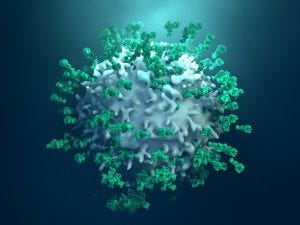
Eli Lilly has three therapy programs attempting to combat COVID-19 but says its monoclonal antibody partnership with AbCellera is the most significant.
In March, Eli Lilly inked a deal to codevelop antibody products for the treatment and prevention of COVID-19, the disease caused by the SARS-CoV-2 novel coronavirus, using AbCellera’s pandemic response platform.
While discussing its first quarter 2020 results, Lilly described the collaboration as the “most significant program” of its active therapeutic programs it is pursuing against COVID-19 and announced GMP manufacture of a candidate has begun.

Image: iStock/Design Cells
“Our scientists have been working together with AbCellera, NIH and academic partners to characterize virus-neutralizing antibodies obtained from one of the first US patients who recovered from the virus,” chief scientific officer Dan Skovronsky told investors. “The most advanced antibody in this program shows potent neutralization of live virus and has now entered GMP manufacturing.”
The manufacture will support clinical trials, with the firms planning to submit an Investigational New Drug (IND) Application to the US Food and Drug Administration (FDA) by the end of May.
And if the firms see positive results, Skovronsky said they are prepared to scale up production rapidly. “We’re working very diligently to expand our manufacturing capacity that would be ready to deploy, both internally and with partnerships, if the neutralizing antibodies are successful. We’re making those investments in advance.”
Lilly’s other COVID-19 programs
While this is Lilly’s most significant program, it is not its most advance. “We started a Phase II trial with a monoclonal antibody against Angiopoietin 2 or Ang2 in pneumonia patients hospitalized with COVID-19 who are at a higher risk of progressing to acute respiratory distress syndrome (ARDS),” Skovronsky said.
“The Ang2 level in plasma is strongly correlated to the ARDS risk and severity, based on multiple studies in humans.”
But unlike the virus-neutralizing antibody program, the production of this monoclonal antibody (MAb) “is more constrained and lead times are longer,” he added.
Lilly’s third program is an investigation of its small molecule drug baricitinib – approved as a treatment for rheumatoid arthritis – as a potential coronavirus therapy.
“We have recently announced it is part of the National Institute of Allergy and Infectious Disease, Adaptive COVID-19 treatment trial. Based on the known anti-inflammatory activity of baricitinib, recent data in preclinical studies and case reports from investigator sponsored clinical trials, we believe baricitinib could have potential to dampen the cytokine storm that occurs when hospitalized COVID-19 patients are fighting to combat the inflammation in their lungs, which often leads to requiring a ventilator.”
Related news: COVID-19 pipeline: Industry flexing its Abs in fight against coronavirus
About the Author
You May Also Like

schedl_b_and_w.jpg?width=100&auto=webp&quality=80&disable=upscale)
schedl_b_and_w.jpg?width=400&auto=webp&quality=80&disable=upscale)






